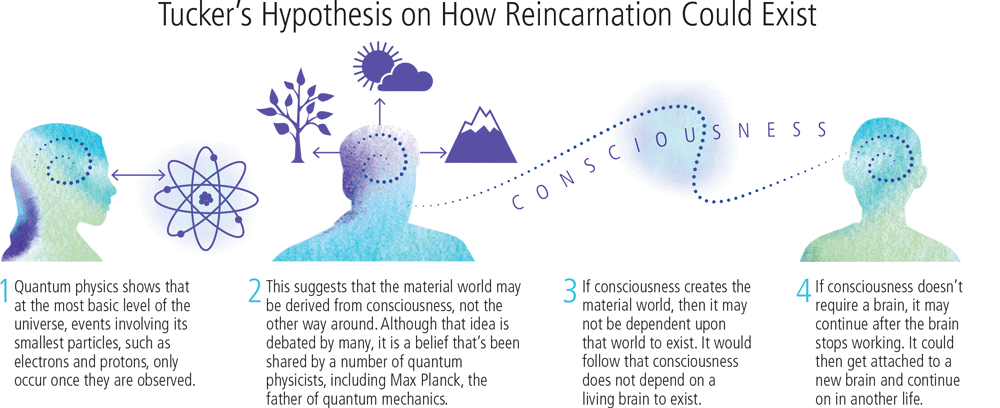
Other Explanations
Raised as a Southern Baptist in North Carolina, Tucker has weighed other, more earthly, explanations to the phenomenon.
He’s looked at fraud, perhaps for financial gain or fame. But most claims usually don’t net a movie deal, and many of the families Tucker’s met, particularly in the West, are reluctant to speak publicly about their child’s unusual behavior. Tucker has also considered simple childhood fantasy play, but that doesn’t explain how the details children offer can sometimes lead back to a particular individual. “It defies logic that it would just be a coincidence,” he says.
Faulty memories of witnesses are likely to present in many cases, Tucker says, but there are dozens of instances where people made notes of what the children were saying almost from the beginning.
“None of those possibilities would also explain some of the other patterns, like the intense emotional attachment many children have to these memories, as Ryan exhibited,” Tucker says.
Tucker believes the relatively small number of claims he and Stevenson collected during the last five decades, especially from America, is partly because parents may dismiss or misunderstand what their children are telling them. “If children get a message that they aren’t being listened to, they will stop talking,” Tucker says. “They see they aren’t supported. Most kids aim to please their parents.”
How exactly the consciousness, or at least memories, of one person, might transfer to another is obviously a mystery, but Tucker believes the answers might be found within the foundations of quantum physics.
Scientists have long known that matter like electrons and protons produces events only when observed.
A simplified example: Take light and shine it through a screen with two slits cut in it. Behind the screen, put a photographic plate that records the light. When the light is unobserved as it travels, the plate shows it went through both slits. But what happens when the light is observed? The plate shows the particles go through just one of the slits. The light’s behavior changes and the only difference is that it is being observed. There’s plenty of debate on what that might mean. But Tucker, like Max Planck, the father of quantum physics, believes that discovery shows that the physical world is affected by, and even derived from the non-physical, from consciousness.
If that’s true, then consciousness doesn’t require a three-pound brain to exist, Tucker says, and so there’s no reason to think that consciousness would end with it.
“It’s conceivable that in some way consciousness could be expressed in a new life,” Tucker says.
Robert Pollock, director of the Center for the Study of Science and Religion at Columbia University, said scientists have long pondered the role observation might play in the physical world, but the hypotheses about it are not necessarily scientific. “Debates among physicists that center on the clarity and beauty of an idea but not on its disprovability are common to my mind, but are not scientific debates at all,” says Pollock. “I think what Planck and others since who have looked at how these very small particles behave and then made inferences about consciousness, are expressing a hope. That’s fine; I hope they are right. But there’s no way to disprove the idea.”
